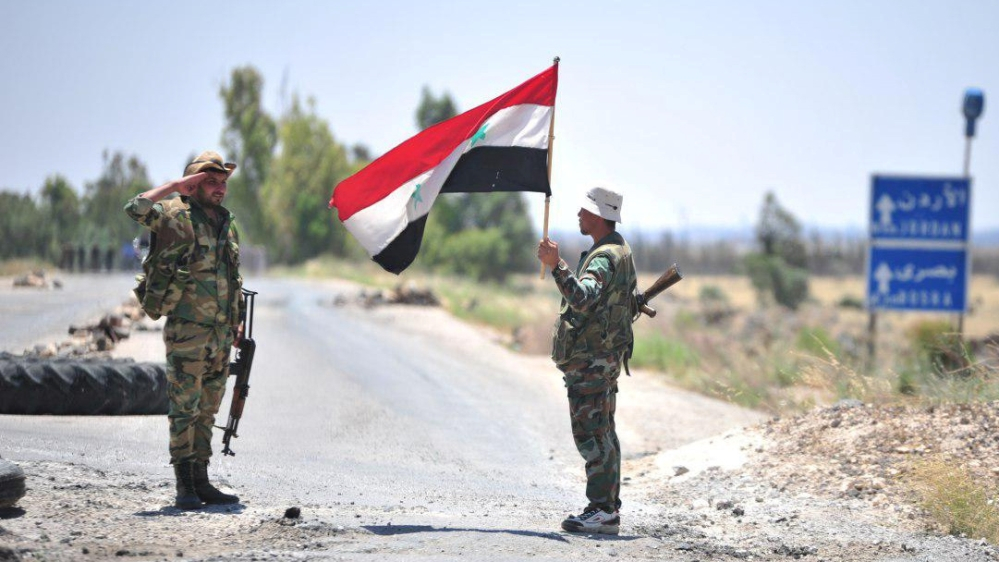A three-day ceasefire came into effect after weeks of intense attacks by pro-government forces on rebels in Deraa City.
A three-day ceasefire has taken hold in the besieged Syrian city of Deraa after weeks of intense attacks by pro-government forces on the rebel-held enclave, local sources told Al Jazeera.
A halt in fighting was announced on Wednesday after Russian generals offered a new plan that appeared to meet some of the rebel demands to involve the Russian military police in patrolling Deraa al-Balad – a southern district of Deraa city – while allowing for the first time a Syrian army security presence in the stronghold.
Rebels said they accepted the plan while the army said it would give its response on Wednesday to the deal, which also allows the Syrian and Russian flags to be raised in the opposition bastion, but gives Moscow guarantees that Iranian-backed army units cannot act with impunity.
Army sources told Reuters news agency Iranian-backed troops that encircled the rebel enclave for the last two months and brought forward reinforcements on Monday would be withdrawn under the deal.
State news agency SANA reported some rebels had begun handing over their weapons in Deraa al-Balad on Wednesday. It added several government-run centres are expected to be open across the city for other rebels to hand over weaponry and “settle” any pending issues.
Meanwhile, independent Syrian news outlet Step News said those who refuse the terms of the deal would be evacuated to the northwestern Idlib province. It is the last opposition-held bastion in the country where some three million people live – half of whom were displaced by previous government offensives in various areas across the country.
Elite Syrian forces aided by pro-Iranian militias stepped up an offensive on Tuesday against the rebel enclave in a southwestern pocket bordering Jordan and Israel, according to residents, military and opposition sources.
Fighting escalated earlier this week after the collapse of a Russian peace plan meant to avert an all-out offensive against Deraa al-Balad, the core of the city of Deraa that has defied state authority since the surrounding Deraa province was recaptured by President Bashar al-Assad’s forces in 2018.
Witnesses and military sources said dozens of improvised missiles were fired into Deraa al-Balad by the Syrian military’s pro-Iranian Fourth Division, which is backed by Iranian-financed local militias.
Dire humanitarian conditions
Deraa al-Balad was the birthplace of peaceful protests against al-Assad’s dictatorial rule that broke out a decade ago – part of the pro-democracy Arab Spring uprisings – before spreading in response to deadly crackdowns by security forces and morphing into a devastating civil war.
The latest army campaign came amid a spate of attacks over the past 24 hours by remnants of rebel groups on army checkpoints and outposts in Dael, Jasem, and other towns across Deraa province, opposition sources and residents said.
A Western intelligence source said several thousand families in towns caught in the crossfire had fled to safer areas near the Jordanian border where the Jordanian army was on alert for a possible new wave of refugees.
The Syrian army said at least four soldiers were killed in ambushes on troops in the towns of Sanameen and Nawa, and rebel shelling caused several casualties in residential areas.
Earlier this week, United Kingdom-based Amnesty International called on the Syrian government to end its siege on Deraa al-Balad and to allow “unfettered humanitarian access” to the area, where some 20,000 people live in dire conditions.
Residents have told the rights group “only women and children under 15 have been allowed out of the besieged area on foot after being subjected to security checks and told to leave their identity cards behind”.
Others have said shops are nearly “empty of all food” with reports of no electricity for lengthy periods.
Government forces, aided by Russian airpower and Iranian militias, retook Deraa province in 2018, and Moscow assured Israel and the United States at the time it would prevent Iranian-backed militias from encroaching on the border zone.
That deal forced thousands of Western-backed rebels to hand over heavy weapons but kept al-Assad’s forces from entering Deraa al-Balad, whose administration remained in opposition hands.
